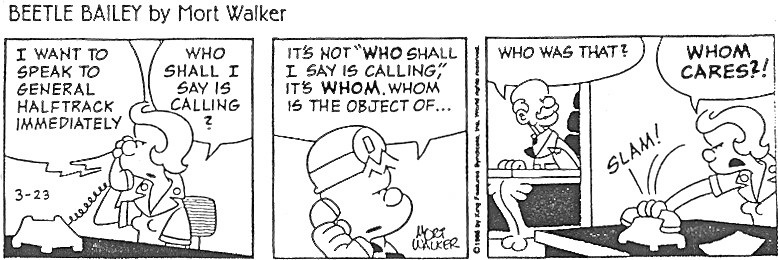Who or Whom?

An artist friend of mine recently wondered aloud in an email to me if her use of the word who should have been whom. Being a Helpful Hanna, I instantly sent her an email with an attachment of a six-page essay I wrote about a year ago on that very subject, case forms. When I had finished the essay, I had an uneasy feeling about my effort and, consequently, never published it, a good thing.
Days passed. Days turned into weeks. Still no response from her. Hmmm.... I went back and re-read the essay: holy moly, no wonder students hate grammar in high school; it’s truly complicated.
I taught high school English for twenty-five years. It has been nineteen years since I last taught an English class. Somehow I managed to get through my own high school experience and my college years majoring in English without raising my knowledge of the language above the miniscule level. Teaching gave me a second chance. By the way, teaching English was a profession to me, not a religion. Frankly, I’m not very judgmental about the way people use the language. George Bush was criticized for the way he mangled the language; however, I understood everything he said. On the other hand, Barack Obama is praised for his mastery of the language; nevertheless, he leaves me totally confused.
With some trepidation, I decided to attempt to do a better job of explaining when to use who and when to use whom. In other words, reduce it to a light snack instead of a seven course meal. However, after I sent the revised version to my artist friend, she said that the term predicate nominative bothered her...hmmm. Okay, I decided to rewrite it again without any mention of the term predicate nominative. Forget I ever mentioned it.

Before continuing reading, if you can’t identify the subject and verb of a sentence, turn back now. If you can, you may survive the journey and become a better person for it. The only other thing you need to be able to recognize is a noun or pronoun that follows a linking verb and renames the subject. Okay, let’s call it the subject renamers, not predicate nominative. If you can identify subjects, verbs, and subject renamers, you’ve got a shot at making the correct decision between who and whom.
We use who for subjects and subject renamers. If it ain’t a subject or subject renamer, use whom. This little simplification eliminates the need to know what direct objects, indirect objects, and objects of prepositions are and having to deal with the name predicate nominative. A “thank-you” would be appropriate now.
In the following sentences, all of the subjects are underlined:
Jack is a boy.
Mary is a girl.
Jack ran.
Jill jumped.
Jack and Jill ran and jumped.
Mary slapped Jack.
Jack slapped himself.
In the same sentences all of the verbs are underlined as follows:
Jack is a boy.
Mary is a girl.
Jack ran.
Jill jumped.
Jack and Jill ran and jumped.
Mary slapped Jack.
Jack slapped himself.
In the preceding sentences,
Jack ran.
Jill jumped.
Jack and Jill ran and jumped.
Mary slapped Jack.
Jack slapped himself,
you can’t have a subject renamer because the verbs are action verbs, something happens--jumping, running, slapping. Only in the sentences
Jack is a boy
Mary is a girl
do you have the possibility of a subject renamer. The subject renamers are boy and girl. There ain’t no action in the word is unless, of course, you’re Bill Clinton.
In other words, only subjects and subject renamers require the nominative case pronoun who. There can only be a subject renamer if there is a linking verb---no action. If it’s not a subject or a subject renamer, use whom.
You may be saying to yourself, “It can’t be that simple.” Well, my friend, it is.
However, you’ve got to pay attention to which verb your pronoun is related to. In the sentence Jack hit the girl who then ran away, who is the subject of the verb ran, not hit. In the sentence Jack is the boy to whom I spoke, whom follows a linking verb, but it’s not a subject renamer. Boy is the subject renamer. Whom is the object of the preposition to. It’s the same deal in Jill is the girl whom we all respect. Whom follows a linking verb, but girl is a subject renamer and whom is the direct object of the action verb respect. Isolate it and turn it about: We all respect whom.

Are there any other complications? Yeah, one tiny one hardly worth mentioning. An appositive is a noun or pronoun that follows another noun or pronoun and renames the first one. If it renames a subject or subject renamer, use who. Otherwise use whom. One more minor Columbo moment: there are many linking verbs in addition to is. All the forms of is are linking...unless they’re used as helping verbs: Jack is running. Some other linking verbs are am, are, was, were, has been, are being, might have been, become, seem. Some verbs may be either action or linking: Jack tasted (action) an apple. The apple tasted (linking) good. One more thing: don’t let question sentences confuse you: often the normal sentence order is turned around in order to make it a question: just turn it into a normal statement and then decide what you have.
Everything we’ve said about who applies to I, he, she, we, and they. That’s the reason one should say, “It is I,” not, “It is me.” If it ain’t a subject or subject renamer, use whom, me, him, her, us, and them. That’s why we should say, “I gave it to him,” not “I gave it to he.”
I realize that you still may make mistakes when choosing between who and whom, but, at least, you now have a basis for making your mistakes.
Subjects and subject renamers and words that rename them require the nominative case who; everything else requires the objective case whom.

enough





